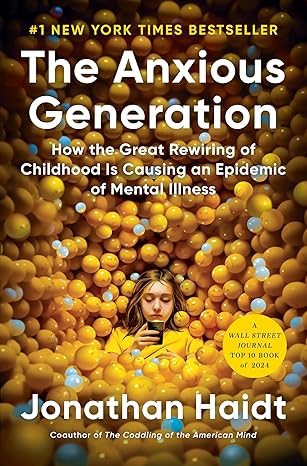Book Review: The Anxious Generation - Parenting in the Age of Social Media
A blanket "No" to all screen time? This book prompts me to rethink. The Anxious Generation by Jonathan Haidt, emphasizes the importance of thoughtful conversations about social media rather than outright fear or restriction. It distinguishes video games from social media, explaining why games don’t have the same harmful psychological effects. Read it, it may help you prepare your kids for the digital world.
5/30/20252 min read


Parenting today isn’t just about setting curfews or limiting screen time—it’s about navigating an era where social media shapes childhood in ways we’ve never seen before. Jonathan Haidt’s The Anxious Generation is an eye-opening read for parents struggling with these questions.
Haidt highlights the hidden dangers of a childhood spent online, pointing out how social media fuels anxiety, self-doubt, and social isolation. He warns that the shift from play-based childhood to phone-based childhood has disrupted social and neurological development. His recommendations—like delaying smartphone access and fostering more real-world interactions—are bold but necessary.
Yet, social media isn’t purely harmful. It’s a double-edged sword, much like alcohol—capable of enriching experiences but also leading to addiction and tunnel vision. When people are happy, alcohol can amplify joy, but when they are sad, it can magnify negativity. Social media works the same way—it can be an engine for creativity and connection or an echo chamber that intensifies doubts and fears.
A More Balanced Approach to Social Media
Rather than banning social media or viewing it as an enemy, parents should approach it the way they do conversations about sex and alcohol:
Not a blanket "no," but a thoughtful conversation
Teaching kids about self-regulation rather than just imposing limits
Helping them understand risks while also acknowledging its benefits
Encouraging moderation, not abstinence
The goal is to prepare kids to navigate digital spaces wisely, just like we prepare them for adult responsibilities. Simply telling kids "social media is bad, don’t use it" is unlikely to work—it’s about teaching critical thinking, mindful consumption, and self-awareness.
Refreshing Take: Video Games vs. Social Media
One of Haidt’s most surprising arguments is his distinction between video games and social media. While many parents group them under "screen time," he explains that video games don’t cause the same level of harm as social media because:
They involve structured engagement, skill-building, and teamwork
They offer clear challenges and rewards, whereas social media fosters comparison and validation-seeking
They don’t correlate with the same rise in anxiety and depression seen with excessive social media use
This perspective is important for parents—instead of fearing all digital activities, understanding which ones promote growth and which ones undermine well-being can lead to better parenting decisions.
The Future: Regulation, Equilibrium, and What Comes Next
Like smoking, vaping, and alcohol, social media will likely reach an equilibrium—where regulation, personal discipline, and cultural adaptation balance its effects. However, just as we settle into this phase, the next disruption looms—AI-generated content. Much like social media transformed information, AI is reshaping how knowledge is created, shared, and processed.
Parents don’t have to fear every new technology. Instead, they should engage, adapt, and have meaningful conversations with their kids. If you’re a parent feeling uncertain about social media’s role in childhood, grab a copy of The Anxious Generation—it’s a guide that might just shift your perspective.